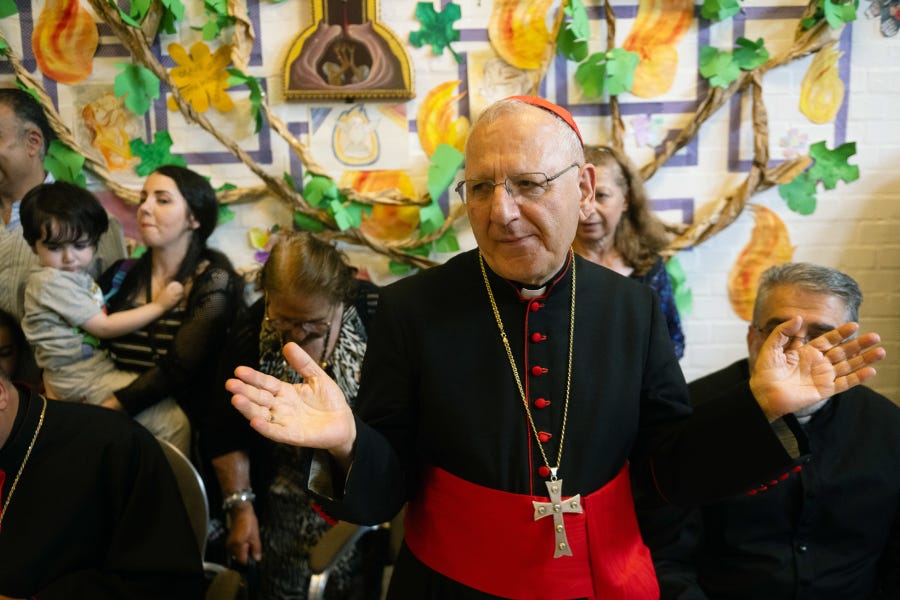The Pontifical Academy for Life has found itself at the center of a social media storm, with the institution’s official account drawing strong criticism over the publication of a new book.
As the academy’s Twitter account was reposting positive reviews of “Theological Ethics of Life. Scripture, Tradition, Practical Challenges,” many users, including theologians and ethicists, started raising questions about the book.
Soon the official account of the pontifical institution was decrying “insults and out-of-control criticism” and appearing to hint at a possible wholesale review of Church teaching on a range of moral issues, including contraception, IVF, and other life issues.
Angry tweets to one side, both critics and supporters have said the book is a boundary-pushing work that could influence the Catholic Church’s stance on bioethical questions.
So, what’s going on? And what is this all about, anyway?
The Pillar explains:
What’s the new book about?
The 528-page Italian volume, issued by the Vatican Publishing House, collects addresses from a three-day seminar sponsored by the pontifical academy in fall 2021.
In an introduction available in English, the pontifical academy’s president Archbishop Vincenzo Paglia explained that the book’s “basic text” was intended to “introduce a paradigm shift.”
He described the shift - which appears to relate to the “theological ethics of life” in the book’s title - as “descriptive and conceptual, as it follows a pattern that is both argumentative and narrative, theoretical and sapiential, phenomenological and interpretative.”
“This allows it to be both receptive and critical of the different fields of human knowledge, offering a welcoming register not only for philosophy and its methods, but also for the humanities and the natural sciences,” he wrote.
What’s a paradigm shift?
The term is associated with the U.S. philosopher Thomas Kuhn, who used it to describe the advance of scientific understanding, in his 1962 book “The Structure of Scientific Revolutions.” Kuhn offered the famous example of how thinkers abandoned a geocentric model of the universe, with the Earth at the center, for a Copernican one, in which the planets revolve around the sun.
The phrase caught on quickly in other areas of academic life. In his 2015 book “Paradigm Shift: How expert opinions keep changing on life, the universe, and everything,” Martin Cohen likened it to an “intellectual virus” spreading through higher education, the arts, and politics.
The phrase has also been popular in some theological circles, associated with writers such as the French Jesuit paleontologist Pierre Teilhard de Chardin. The term has also been frequently applied to Pope Francis - both by allies and opponents.
What critics say
Writing for the Italian website Daily Compass, Luisella Scrosati said the new book challenged the Church’s condemnation of contraception, reaffirmed in the 1968 encyclical Humanae vitae.
She said that it “supports the thesis that ‘in conditions and practical circumstances that would make the choice to generate irresponsible,’ one could resort ‘with a wise choice’ to contraceptive techniques, ‘obviously excluding any that are abortogenic.’”
“This ‘advancement of theological bioethics’ aims directly at the relativization of the negative precepts of the moral law, exactly as Amoris laetitia had already done: the absoluteness of the negative precepts is confined to theory, in order to relativize them - and thus deny them as absolute - in the concrete case,” she argued.
What supporters say
In an article posted in four languages on the pontifical academy’s website, Pierangelo Sequeri wrote that the institution’s decision to host “a wide-ranging theological and moral debate is a symbol of noticeable intellectual honesty that does honor to the Church itself.”
Sequeri, dean of the John Paul II Pontifical Theological Institute for Marriage and Family Sciences, added that “unfinished business and new issues need to be addressed, not swept under the rug.”
What the Academy said (on Twitter, anyway)
The pontifical academy’s Twitter account is hitting back at “insults and out-of-control criticism” sparked by the book, but appears to have gone a lot further than simply defending the publication of the book as a collection of contributions to a debate.
The account, believed to be run by the institution’s social media manager Fabrizio Mastrofini, engaged in a back and forth with a Twitter user describing himself as a “tad of a Trad.” It disputed that the book represented a “deviation” from Church teaching, insisting instead that it embodied “debate and dialogue.”
When the Twitter user suggested that “the correct response is to *unambiguously* defend Church teaching and condemn dissent on these settled matters,” the pontifical academy replied: “You mean to ‘condemn’ real people, concrete persons in difficulty in their private life and in their intimate relationships. I think that the right approach is mercy and dialogue. Luke 6,36-37 for instance…”
It added: “Be careful: what is dissent today, can change. It is not relativism, it is the dynamics of the understanding of phenomena and science: the Sun does not rotate around the Earth. Otherwise there would be no progress and everything would stand still. Even in theology. Think about it.”
“Life issues is not [sic] a matter of taking fundamentalist positions with ideology, but of opening the debate within the community of moral theologians,” the account said in a tweet paraphrasing a quotation in an article on the U.S. Supreme Court’s abortion ruling.
This prompted several users, including moral theologians, to flag statements from Pope Francis on issues like abortion and ask the academy’s account to clarify the scope of debate and if the pope was using “fundamentalist” language.
What’s next?
Of course, it might be seen as highly unusual for a think tank of the Holy See to engage in Twitter polemics with seemingly randomly selected American Catholics. But it’s not that unusual for the Pontifical Academy for Life.
In January of this year, for example, the academy’s account waded into the fractious online debate around COVID-19 vaccines, condemning the use of social media to spread “malinformation” and “pure nonsense” about vaccines and the historic link between some cell lines used in their development and abortion. The account specifically criticized “some ‘Catholics’ [who] only insult [the Pontifical Academy’s president] Archbishop Vincenzo Paglia” in what it claimed was an effort to “discomfort” the American President Joe Biden.
Back in April 2021, the account got a lot of online pushback when it marked the death of controversial Swiss theologian Hans Küng, describing him as “a great figure in the theology of the last century whose ideas and analyzes must always make us reflect on the Catholic Church, the Churches, the society, the culture.”
But in that case, while the initial tweet was surprising, the pontifical academy did not wade into the resulting discourse.
As to “Theological Ethics of Life. Scripture, Tradition, Practical Challenges,” a favorable review of the book in the July 2 edition of the influential Jesuit journal La Civiltà Cattolica concluded by suggesting that Pope Francis could write “a new encyclical or apostolic exhortation on bioethics, which he might perhaps title Gaudium vitae” (“The Joy of Life.”)
That idea was picked up by America’s Gerard O’Connell, who wrote that “interesting times lie ahead if the reflections reported in the [Civiltà Cattolica] essay speak to what may be afoot at the Vatican.”
While speculating on a possible future papal document could be just that - speculation - the floating of a specific title of “Gaudium vitae” could be an indicator that such a document is already being drafted. If it is, it will be hotly anticipated, and closely scrutinized, for the kind of “paradigm shift” the academy seems to be predicting.



